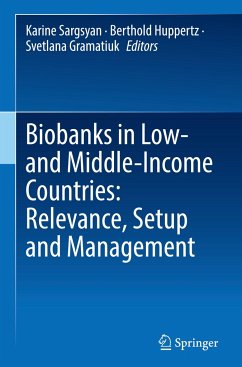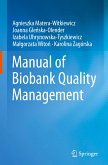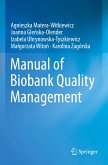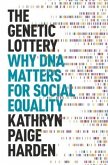Biobanks in Low- and Middle-Income Countries: Relevance, Setup and Management
Herausgegeben:Sargsyan, Karine; Huppertz, Berthold; Gramatiuk, Svetlana
Biobanks in Low- and Middle-Income Countries: Relevance, Setup and Management
Herausgegeben:Sargsyan, Karine; Huppertz, Berthold; Gramatiuk, Svetlana
- Gebundenes Buch
- Merkliste
- Auf die Merkliste
- Bewerten Bewerten
- Teilen
- Produkt teilen
- Produkterinnerung
- Produkterinnerung
This book introduces the fundamentals of biobanking and guides through the practical planning thereof, with a special focus on the situation in low- and middle-income countries. On the example of the setup of a Ukrainian biobank the book discusses the main steps and aspects of successful biorepository implementation and management. Topics covered include collection, storage and shipping of samples, establishment of an IT system, development of a sustainability plan, and project and risk management. Furthermore, the importance of the formation of international biobanking societies such as the…mehr
Andere Kunden interessierten sich auch für
![Biobanks in Low- and Middle-Income Countries: Relevance, Setup and Management Biobanks in Low- and Middle-Income Countries: Relevance, Setup and Management]() Biobanks in Low- and Middle-Income Countries: Relevance, Setup and Management45,99 €
Biobanks in Low- and Middle-Income Countries: Relevance, Setup and Management45,99 €![Manual of Biobank Quality Management Manual of Biobank Quality Management]() Agnieszka Matera-WitkiewiczManual of Biobank Quality Management45,99 €
Agnieszka Matera-WitkiewiczManual of Biobank Quality Management45,99 €![Manual of Biobank Quality Management Manual of Biobank Quality Management]() Agnieszka Matera-WitkiewiczManual of Biobank Quality Management45,99 €
Agnieszka Matera-WitkiewiczManual of Biobank Quality Management45,99 €![Exploring Central and Eastern Europe's Biotechnology Landscape Exploring Central and Eastern Europe's Biotechnology Landscape]() Exploring Central and Eastern Europe's Biotechnology Landscape77,99 €
Exploring Central and Eastern Europe's Biotechnology Landscape77,99 €![The Genetic Lottery The Genetic Lottery]() Kathryn Paige HardenThe Genetic Lottery26,99 €
Kathryn Paige HardenThe Genetic Lottery26,99 €![Proceedings of the 2012 International Conference on Applied Biotechnology (ICAB 2012) Proceedings of the 2012 International Conference on Applied Biotechnology (ICAB 2012)]() Proceedings of the 2012 International Conference on Applied Biotechnology (ICAB 2012)150,99 €
Proceedings of the 2012 International Conference on Applied Biotechnology (ICAB 2012)150,99 €![Proceedings of the 2012 International Conference on Applied Biotechnology (ICAB 2012) Proceedings of the 2012 International Conference on Applied Biotechnology (ICAB 2012)]() Proceedings of the 2012 International Conference on Applied Biotechnology (ICAB 2012)150,99 €
Proceedings of the 2012 International Conference on Applied Biotechnology (ICAB 2012)150,99 €-
-
-
This book introduces the fundamentals of biobanking and guides through the practical planning thereof, with a special focus on the situation in low- and middle-income countries. On the example of the setup of a Ukrainian biobank the book discusses the main steps and aspects of successful biorepository implementation and management. Topics covered include collection, storage and shipping of samples, establishment of an IT system, development of a sustainability plan, and project and risk management. Furthermore, the importance of the formation of international biobanking societies such as the Ukraine Association of Biobanks is highlighted, and their main objectives and tasks are discussed.
The book addresses life science and business professionals as well as national authorities who are interested in biobanking in general and in setting up a biobank in particular.
The book addresses life science and business professionals as well as national authorities who are interested in biobanking in general and in setting up a biobank in particular.
Produktdetails
- Produktdetails
- Verlag: Springer / Springer International Publishing / Springer, Berlin
- Artikelnr. des Verlages: 978-3-030-87636-4
- 1st edition 2022
- Seitenzahl: 256
- Erscheinungstermin: 17. März 2022
- Englisch
- Abmessung: 241mm x 160mm x 20mm
- Gewicht: 553g
- ISBN-13: 9783030876364
- ISBN-10: 3030876365
- Artikelnr.: 62452208
- Herstellerkennzeichnung
- Springer Nature c/o IBS
- Benzstrasse 21
- 48619 Heek
- Tanja.Keller@springer.com
- Verlag: Springer / Springer International Publishing / Springer, Berlin
- Artikelnr. des Verlages: 978-3-030-87636-4
- 1st edition 2022
- Seitenzahl: 256
- Erscheinungstermin: 17. März 2022
- Englisch
- Abmessung: 241mm x 160mm x 20mm
- Gewicht: 553g
- ISBN-13: 9783030876364
- ISBN-10: 3030876365
- Artikelnr.: 62452208
- Herstellerkennzeichnung
- Springer Nature c/o IBS
- Benzstrasse 21
- 48619 Heek
- Tanja.Keller@springer.com
Prof. h. c. Karine Sargsyan, MD was born in Armenia and lives in Graz. She is Managing Director for International Biobanking and Education at the Medical University of Graz and Vice Scientific Leader and Lecturer of the course M.Sc. Biobanking and of Human Centred Artificial Intelligence in Medicine at Medical University of Graz. Due to her professional experience, she is a leading member of many scientific organisations such as the ISBER (International Society for Biological and Environmental Repositories), the ESBB (European, Middle Eastern & African Society for Biopreservation and Biobanking), etc. She provides scientific expertise and experience as a consultant/advisory board member to several institutional organisations (BBMRI.pl, Oncology Research Vietnam, Qatar Biobank, DLR, Ministry of Health of Armenia, NMRRC Russia, etc.). She is a Visiting Professor of Medical Genetics at Yerevan State Medical University, where she also completed her MD in paediatrics. In her free time, she enjoys painting (three exhibitions), playing the piano and happily commits herself to various voluntary activities. Prof. Dr. Berthold Huppertz is a German biologist with more than 25 years experience in the medical field. Berthold is chair of a preclinical division as well as Head of the Master course in Biobanking at Medical University of Graz, Austria. For seven years he was Director of Biobank Graz, the largest clinical biobank in Europe. Berthold has published more than 230 scientific papers in peer-reviewed journals as well as more than 40 book chapters in scientific and teaching books. With his biological, medical and biobanking background, he loved to work on this book. Dr. Gramatiuk Svetlana, MD, PhD, is a graduate of the National Medical University of Kharkiv. She studied Biobanking at the Medical University of Graz, Austria, and Infectious Diseases Medicine and Virology, Microbiology and Allergology at the NationalMedical University of Kharkiv. Dr. Gramatiuk has been practicing since 2004, spending the last 5 years in Kharkiv at the Institute of Cellular Biorehabilitation, which is one of the top 10 regenerative medicine centers in Ukraine. Svetlana specializes in the care of metabolic diseases and oncological patients in her practice. She is also interested in the mitochondrial complex in stem cell and regenerative medicine. In addition, Svetlana is a clinical associate professor of pathophysiology at the Medical Postgraduate Institute. She then worked as the head of the research laboratory at the Institute of Medical Radiology of Ukraine. In 2017, she was appointed President of the Ukrainian Association of Biobanks. In 2018, she was appointed Assistant Professor of Medicine and Co-Director of the Biobanking Group of the Medical Postgraduate Institute. Dr. Gramatiuk will soon complete 15 years in academic medicine in Kharkiv and is still training medical students and residents in biobanking, pathophysiology, and infectious diseases. Her main goal is to teach the art and practice of biobanking to ultimately train the best and most caring doctors possible.
Introduction to Biobanking.- Scientific Relevance, Problems and the Destitution for Principles of Biobanks and Biobanking Activities.- Types of Biobanks.- Ethical and Legal Principles in the Field of Biobanking.- Business Planning for Biobanks.- Biobanking Concepts Specific for Developing Countries.- Methods of Implementation and Set-up of National Biobanking Networks.- Implementation of Ethical and Legal Considerations in a Biobanking Network.- Collection and Management of Samples.- Quality Control and Risk Management in Biobanks.- Governance and Stakeholder Analysis.- Biobanking IT Systems, Database Structure and Web Applications.- Management Model and Sustainability Plan of Biobanks.- Sustainability Plan and Project Management of a Biobanking Network.- Establishing a Biobank Using Standardisation.- Science and Innovation of Biobanks.- Running a Biobank Network.- Infrastructure: Delivering on the Promise of Biobanking.- Design Considerations and Equipment of Biobanks.- Software Toolsfor Biobanking in LMICs.- The Importance of Cancer Biobanks in Low- and Middle-Income Countries.- Biobanking in Paediatrics: A Look from Armenia as a Middle-Income Country.- Biobanking of the Central Nervous System.- The Importance of Biobanking COVID-19 Samples.- Oncobiobanking in a Middle-Income Country: The Example of Russia.- Sustainability of Biobanks and Biobanking in LMICs.- Biobanks for Enabling Research and Development by Trusted Patient Data Environment.- Future Perspective of the Biobanking Field.
Introduction to Biobanking.- Scientific Relevance, Problems and the Destitution for Principles of Biobanks and Biobanking Activities.- Types of Biobanks.- Ethical and Legal Principles in the Field of Biobanking.- Business Planning for Biobanks.- Biobanking Concepts Specific for Developing Countries.- Methods of Implementation and Set-up of National Biobanking Networks.- Implementation of Ethical and Legal Considerations in a Biobanking Network.- Collection and Management of Samples.- Quality Control and Risk Management in Biobanks.- Governance and Stakeholder Analysis.- Biobanking IT Systems, Database Structure and Web Applications.- Management Model and Sustainability Plan of Biobanks.- Sustainability Plan and Project Management of a Biobanking Network.- Establishing a Biobank Using Standardisation.- Science and Innovation of Biobanks.- Running a Biobank Network.- Infrastructure: Delivering on the Promise of Biobanking.- Design Considerations and Equipment of Biobanks.- Software Toolsfor Biobanking in LMICs.- The Importance of Cancer Biobanks in Low- and Middle-Income Countries.- Biobanking in Paediatrics: A Look from Armenia as a Middle-Income Country.- Biobanking of the Central Nervous System.- The Importance of Biobanking COVID-19 Samples.- Oncobiobanking in a Middle-Income Country: The Example of Russia.- Sustainability of Biobanks and Biobanking in LMICs.- Biobanks for Enabling Research and Development by Trusted Patient Data Environment.- Future Perspective of the Biobanking Field.









